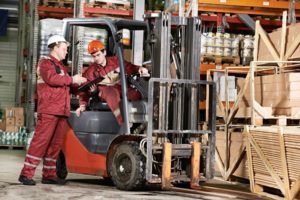 Forklifts are an indispensable tool in business and industry. They can be found in factories, supermarkets, warehouses, and construction sites. Unfortunately, they also play a role in thousands of serious injuries and deaths every year. According to the Occupational Safety and Health Administrative (OSHA) forklifts account for more than 100,000 accidents per year.
Forklifts are an indispensable tool in business and industry. They can be found in factories, supermarkets, warehouses, and construction sites. Unfortunately, they also play a role in thousands of serious injuries and deaths every year. According to the Occupational Safety and Health Administrative (OSHA) forklifts account for more than 100,000 accidents per year.
Common Types of Forklift Accidents
Forklifts are heavy and can cause very serious injuries. Common forklift accidents involve:
- Forklift tipping over and crushing the operator or another person
- Being run over or hit by a forklift
- Being crushed between a forklift and a surface
- Load dropped from a forklift onto a person
Sadly, most forklift accidents are preventable and can be caused by a number of different factors. A defectively manufactured or designed forklift can cause serious injury, but most accidents are usually caused by negligence on the part of the forklift operator and/or the employer.
Operator Negligence
Some accidents result from a failure of the forklift operator to use reasonable care. Common operator-related causes of forklift accidents include:
- Excessive speed—going fast in a forklift can increase the chance of the forklift tipping over and increases the risk of hitting other worker, vehicles, or passers-by
- Driving with an elevated load—this dramatically increases the risk of a load being dropped and injuring someone
- Horseplay—for example giving people rides on the forks of the forklift can be very dangerous.
- Backing up when it is not safe—looking behind and communicating with other workers when backing up is important
- Improper braking or steering—there are hazards involved that can result in the forklift tipping over or losing its load.
- Unbalanced loads—can also cause tipping or dropping of loads
Employer Negligence
Employers have a duty to keep the workplace a safe environment. OSHA has specific regulations and rules that workplaces are supposed to follow to ensure worker safety. An employer’s negligence can involve:
- Failure to provide proper training to employees—employees should be trained on appropriate forklift operation and safety and maintenance standards.
- Failure to adopt clear safety rules and procedures for the operation of forklifts—workers should be held accountable if they fail to follow safety rules.
- Failure to properly maintain the forklift as required—forklifts should be inspected daily to check that things like horns, brakes, lights, and steering mechanisms are working the way they should.
- Allowing individuals under 18 years of age operate the forklift
- Maintaining the work area in a safe condition for forklifts—low clearance areas should be appropriately labeled, forklift areas should be designated, and aisles should be wide enough and free from clutter.
Contact an Experienced Attorney
If you’ve been injured in a forklift accident, you should have an experienced attorney evaluate your case. At Bonina & Bonina, P.C., we have over 50 years of experience helping injured New Yorkers. Contact us online or call us at 1-888-MEDLAW1 to schedule your free consultation. Home and hospital visits are available. Se habla español.
